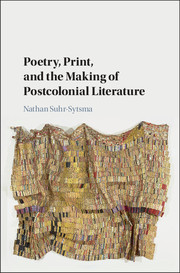23 results
Chapter 24 - Postcolonial Poetry and the Decolonization of the English Literary Curriculum
- from Part IV - Canon Revisions
-
-
- Book:
- Decolonizing the English Literary Curriculum
- Published online:
- 02 November 2023
- Print publication:
- 09 November 2023, pp 454-472
-
- Chapter
-
- You have access
- Open access
- HTML
- Export citation
Forms of Interreligious Encounter in Contemporary Nigerian Fiction – CORRIGENDUM
-
- Journal:
- African Studies Review / Volume 65 / Issue 4 / December 2022
- Published online by Cambridge University Press:
- 10 October 2022, p. 1046
-
- Article
-
- You have access
- Open access
- HTML
- Export citation
Forms of Interreligious Encounter in Contemporary Nigerian Fiction
-
- Journal:
- African Studies Review / Volume 65 / Issue 3 / September 2022
- Published online by Cambridge University Press:
- 30 August 2022, pp. 669-691
-
- Article
-
- You have access
- Open access
- HTML
- Export citation
Chapter 16 - In Print
- from IV - Publishing
-
-
- Book:
- Seamus Heaney in Context
- Published online:
- 15 March 2021
- Print publication:
- 01 April 2021, pp 177-187
-
- Chapter
- Export citation
Interchapter - Mbari Publications and the CIA
- from Chapter 1 - Provincializing the Greenwich Meridian
-
- Book:
- Poetry, Print, and the Making of Postcolonial Literature
- Published online:
- 18 July 2017
- Print publication:
- 10 July 2017, pp 60-74
-
- Chapter
- Export citation
Acknowledgments
-
- Book:
- Poetry, Print, and the Making of Postcolonial Literature
- Published online:
- 18 July 2017
- Print publication:
- 10 July 2017, pp vii-x
-
- Chapter
- Export citation
Conclusion - The Haunting of Seamus Heaney and Geoffrey Hill
- from Chapter 4 - Publishing the Troubles
-
- Book:
- Poetry, Print, and the Making of Postcolonial Literature
- Published online:
- 18 July 2017
- Print publication:
- 10 July 2017, pp 196-209
-
- Chapter
- Export citation

Poetry, Print, and the Making of Postcolonial Literature
-
- Published online:
- 18 July 2017
- Print publication:
- 10 July 2017
Contents
-
- Book:
- Poetry, Print, and the Making of Postcolonial Literature
- Published online:
- 18 July 2017
- Print publication:
- 10 July 2017, pp v-v
-
- Chapter
- Export citation
Chapter 2 - Editing the Commonwealth
-
- Book:
- Poetry, Print, and the Making of Postcolonial Literature
- Published online:
- 18 July 2017
- Print publication:
- 10 July 2017, pp 75-121
-
- Chapter
- Export citation
Notes
-
- Book:
- Poetry, Print, and the Making of Postcolonial Literature
- Published online:
- 18 July 2017
- Print publication:
- 10 July 2017, pp 210-270
-
- Chapter
- Export citation
Chapter 3 - Fashioning the Modern African Poet
-
- Book:
- Poetry, Print, and the Making of Postcolonial Literature
- Published online:
- 18 July 2017
- Print publication:
- 10 July 2017, pp 122-161
-
- Chapter
- Export citation
Chapter 4 - Publishing the Troubles
-
- Book:
- Poetry, Print, and the Making of Postcolonial Literature
- Published online:
- 18 July 2017
- Print publication:
- 10 July 2017, pp 162-209
-
- Chapter
- Export citation
Interchapter - Derek Walcott and the London Magazine
- from Chapter 2 - Editing the Commonwealth
-
- Book:
- Poetry, Print, and the Making of Postcolonial Literature
- Published online:
- 18 July 2017
- Print publication:
- 10 July 2017, pp 107-121
-
- Chapter
- Export citation
Copyright page
-
- Book:
- Poetry, Print, and the Making of Postcolonial Literature
- Published online:
- 18 July 2017
- Print publication:
- 10 July 2017, pp iv-iv
-
- Chapter
- Export citation
Chapter 1 - Provincializing the Greenwich Meridian
-
- Book:
- Poetry, Print, and the Making of Postcolonial Literature
- Published online:
- 18 July 2017
- Print publication:
- 10 July 2017, pp 31-74
-
- Chapter
- Export citation
Introduction
-
- Book:
- Poetry, Print, and the Making of Postcolonial Literature
- Published online:
- 18 July 2017
- Print publication:
- 10 July 2017, pp 1-30
-
- Chapter
- Export citation
Interchapter - James Simmons’s Nigeria and the Honest Ulsterman
- from Chapter 3 - Fashioning the Modern African Poet
-
- Book:
- Poetry, Print, and the Making of Postcolonial Literature
- Published online:
- 18 July 2017
- Print publication:
- 10 July 2017, pp 152-161
-
- Chapter
- Export citation
Note on Diacritical Marks
-
- Book:
- Poetry, Print, and the Making of Postcolonial Literature
- Published online:
- 18 July 2017
- Print publication:
- 10 July 2017, pp xi-xii
-
- Chapter
- Export citation
Index
-
- Book:
- Poetry, Print, and the Making of Postcolonial Literature
- Published online:
- 18 July 2017
- Print publication:
- 10 July 2017, pp 271-287
-
- Chapter
- Export citation



